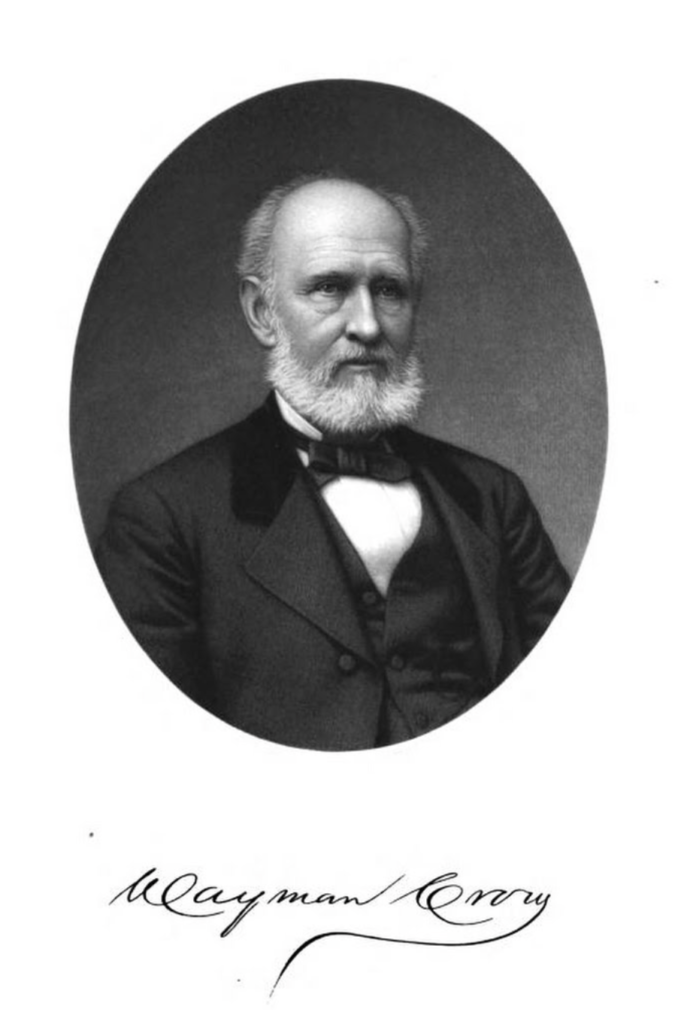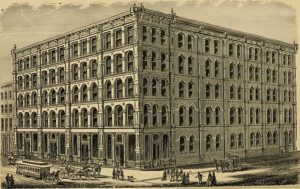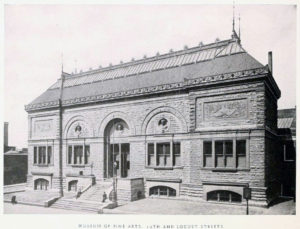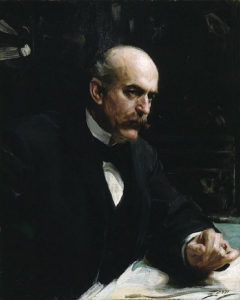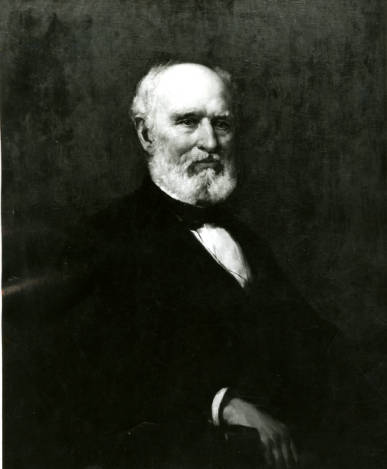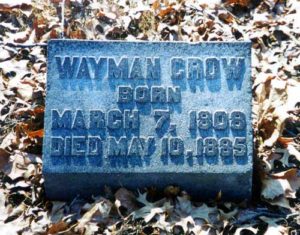A Distinguished Benefactor
Wayman Crow
603 Garrison Avenue
Birth: March 7, 1808 – Hartford, Ohio County, Kentucky
Death: May 10, 1885 – Saint Louis St. Louis City, Missouri
Burial: Bellefontaine Cemetery
Family links:
Parents:
Joshua Crow (1760 – 1830)
Mary Wayman (1768-1827)
Spouse:
Isabella Buck Conn Crow (1813 – 1892)*
Siblings:
Anne Wayman Crow McCreery (1792 – 1869)*
John Wayman Crow (1794 – 1860)*
Phillips Crow (1806 – 1868)*
The Founder of Washington University
The founder of the School of Fine Arts of Washington University was the Honorable Wayman Crow. Mr. Crow was the youngest son of Joshua Crow. His father was born in Virginia, April 18, 1760, and March 27, 1788, married Mary Wayman, at Poplar Spring, Anne Arundel County, Maryland. The issue of this union was twelve children, all of whom, except two boys who died in childhood, reached mature years.
“The subject of this sketch inherited his activity and executive capacity from his mother.”
The Crows came from North Irish stock; the Waymans were of English extraction. Joshua Crow died in Hartford, KY, April 20, 1830. He was a man of good abilities and sterling integrity, but somewhat deficient in vigor of character. His wife, who died near Hopkinsville, KY., September 27, 1827, was endowed with strong native sense and extraordinary energy. The subject of this sketch inherited his activity and executive capacity from his mother.
Wayman Crow was born in Hartford, KY., March 7,1808. When Wayman was six years old his father moved to Hopkinsville, Ky. At the age of seven, Wayman was sent to the district school. The school-house, situated in the outskirts of the village, was a rude log cabin, whose chinks were imperfectly closed with mud. The floor was clay. It was here in this log cabin that Wayman, between the ages of seven and eleven, and under teachers whose system of instruction was as rude as the building in which they taught, acquired the elements of his imperfect education.
In 1819 his father removed to a farm six miles from Hopkinsville, and here Wayman spent one year, attending school in the winter and working on the farm in the summer. In February, 1820, he was, at the age of twelve, apprenticed to Strother J. Hawkins, who kept a store of assorted dry-goods, groceries and hardware in Hopkinsville. The period of his apprenticeship was five years. By the terms of his indenture, he was to receive his “victuals and clothes” and to board in the family of his “master.” He took his meals with the family, but slept on a cot in the counting-room. He made the fires, brought water from a sprint two hundred yards from the house, opened, swept, and closed the store. Mr. Hawkins was a thorough merchant, and under his careful instruction, Wayman easily mastered the difficulties of bookkeeping by double entry, and became familiar with all the duties incident to the conduct of a country store. In the course of a year and a half Mr. Hawkins retired from business, and Wayman was transferred by agreement to the firm of Anderson & Alterbury.
 These merchants had previously been doing a wholesale business in Baltimore, and in consequence of their unfamiliarity with the details of a retail trade, Wayman, though not yet fifteen years old, was intrusted with the chief control of their business. To him was confided the responsible duty of making out the inventory for purchased and lists of credits. After the expiration of his apprenticeship, he was employed by the firm at a salary of three hundred dollars per annum, and at the end of the first year Messrs. Anderson & Aterbuty offered to establish a branch house, furnish it with three thousand dollars’ worth of merchandise, and give Wayman one-quarter of the profits to manage the business. The young clerk accepted the offer, and in October, 1826, opened a store in Cadiz, Kentucky. Although Cadiz is only twenty miles from Hopkinsville, six months elapsed before Wayman received a visit from either of his employers. Their confidence in his integrity and capacity did not need the reassurance of frequent inspection of his books.
These merchants had previously been doing a wholesale business in Baltimore, and in consequence of their unfamiliarity with the details of a retail trade, Wayman, though not yet fifteen years old, was intrusted with the chief control of their business. To him was confided the responsible duty of making out the inventory for purchased and lists of credits. After the expiration of his apprenticeship, he was employed by the firm at a salary of three hundred dollars per annum, and at the end of the first year Messrs. Anderson & Aterbuty offered to establish a branch house, furnish it with three thousand dollars’ worth of merchandise, and give Wayman one-quarter of the profits to manage the business. The young clerk accepted the offer, and in October, 1826, opened a store in Cadiz, Kentucky. Although Cadiz is only twenty miles from Hopkinsville, six months elapsed before Wayman received a visit from either of his employers. Their confidence in his integrity and capacity did not need the reassurance of frequent inspection of his books.
In December, 1828, Messrs. Anderson & Alterbury, in consequence of their determination to move to Pittsburgh as a larger field for mercantile operations, voluntarily offered to sell Wayman on credit their stock of goods at Cadiz. But Wayman was still in his non-age, and to his suggestion that the note of a minor is not legally binding, his employers replied that they were willing to assume the risk, feeling assured that he would never plead the statute of infancy in bar of a just claim.
November 5, 1829, Mr. Crow married Miss Isabella B. Conn, the third daughter of Captain H. Conn, of Union County, Ky. Of this marriage nine children were born, of whom Alphousine, Victor, Medora and Alice died in childhood, while Cornelia, Emma, Mary, Isabel and Wayman reached adult life.
In the fall of 1826, when he was only nineteen years old, Mr Crow was appointed postmaster at Cadiz. He held this trust till the winter of 1832, when, in consequence of his support of Henry Clay for the presidency, he was removed from office. But his dismissal was so unpopular that no citizen of Cadiz would accept the position, and the vacancy was filled by a man from Hopkinsville.
For some time Mr. Crow had been contemplating a removal to a larger field of commercial enterprise. In the sprint of 1835 he set out in quest of a new home. Detained in St. Louis for several weeks by a severe illness, he used the opportunities of convalescence to examine the business features of the place, and deeply impressed with its commercial facilities, he determined to settle in St. Louis.
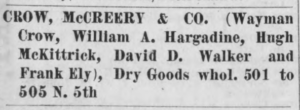 At this time Mr. Crow formed a partnership with his cousin, Joshua Tevis, of Philadelphia, and on the 18th of November, 1835, he landed at St. Louis, and began business under the style of “Crow & Tevis.” Such was the humble beginning of one of the largest commercial houses in St. Louis. Under the later hames of “Crow, McCreery & Co.” and “Crow, Hargadine & Co.” the firm has continued in business until the present time.
At this time Mr. Crow formed a partnership with his cousin, Joshua Tevis, of Philadelphia, and on the 18th of November, 1835, he landed at St. Louis, and began business under the style of “Crow & Tevis.” Such was the humble beginning of one of the largest commercial houses in St. Louis. Under the later hames of “Crow, McCreery & Co.” and “Crow, Hargadine & Co.” the firm has continued in business until the present time.
From the date of its organization the house has never known a reverse or received a stain upon its commercial honor. From the beginning Mr. Crow has been the head of the firm, and it was chiefly owing to his practical wisdom and business foresight that the firm has been able safely to weather the financial storms that have from time to time swept so disastrously over the country.
One sentence is specially worthy of quotation: “To us our commercial honor is as dear as our lives; to preserve it we are prepared to make any pecuniary sacrifice short of impairing our ability to pay ultimately every dollar we owe.”
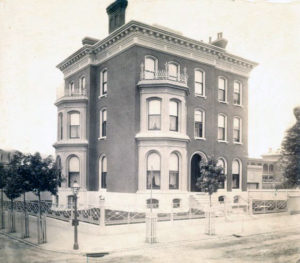
Wayman Crow Residence. 603 Garrison Avenue. Photograph by unknown, late 19th century Missouri History Museum Photograph and Print Collection.

